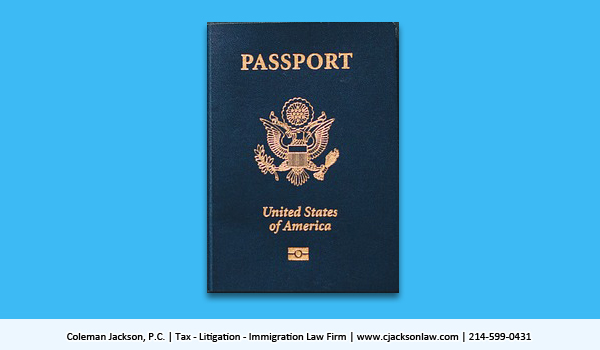By Coleman Jackson, Attorney, Certified Public Accountant
August 21, 2019
Ever heard of the Fixing America’s Surface Transportation (FAST) Act of 2015? Well, under FAST the IRS has the authority to notify the State Department of taxpayers certified as owing the federal government. A significant tax debt is currently defined as a delinquent tax bill of $52,000 or more. The FAST requires the State Department to revoke the delinquent taxpayer’s U.S. passport and limit the taxpayer’s ability to travel outside the United States.
Taxpayer’s who intend to travel outside the United States must negotiate with the IRS to get the delinquent tax certification lifted. Until that happens the taxpayer could become stranded outside of the U.S. with a revoked passport, or be blocked receiving a passport for the first time or on renewal leaving them unable to travel out of the country for any reason.
The IRS has identified several ways taxpayers can avoid having the IRS notify the State Department of their seriously delinquent tax debt as follows:
- Paying the tax debt in full;
- Paying the tax debt timely under an approved installment agreement;
- Paying the tax debt timely under an accepted offer in compromise;
- Paying the tax debt timely under the terms of a settlement agreement with the Department of Justice;
- Having a pending collection due process appeal with a levy; or
- Having collection suspended because a taxpayer has made an innocent spouse election or requested innocent spouse relief.
The practical tip: taxpayers who have to travel abroad must responsibility deal with their federal tax obligations long before they need to travel; because other than option one, above (paying the tax debt in full), the suggested options take months and some of them even take years to resolve in negotiations with the IRS.
The following types of taxpayers have been exempted from the delinquent taxpayer certification requirements under FAST:
- Taxpayers in bankruptcy proceedings;
- Identity Theft Victims;
- Taxpayers whom the IRS has deemed non-collectible;
- Taxpayers located within a federal declared disaster area;
- Taxpayers with pending Installment Agreement request;
- Taxpayers with pending Offer in Compromise with the IRS; or
- Taxpayers with an IRS accepted adjustment that will satisfy the debt in full; and
- Taxpayer’s serving in a combat zone is not exempt from the certification rules, but the certification is postponed while they do their tour of duty in the combat zone.
Taxpayers with plans to travel abroad simply need to be aware of the fact that their plans can be totally upended if they owe the federal government $52,000 or more in back taxes. The $52,000 could be owed on personal income taxes or business taxes where the individual taxpayer has been found be to be a responsible party, such as in payroll taxes with respect to the trust fund penalty that usually applies to delinquent taxpayer who owns the business or even employees of the business responsible for deciding what vendors and suppliers get paid and when. Also the $52,000 certification threshold can be reached for a single tax period or multiple tax periods combined. Example No 1, the taxpayer owes the IRS $2,000 for 2009, $14, 000 for 2015, and $40,000 for 2018. In this example the taxpayer is seriously delinquent and the IRS under FAST can certify them as seriously delinquent to the U.S. State Department. Example No. 2, the taxpayer owns a windmill manufacturing company with twenty employees; their business slowed to a whisper in the third quarter 2019 and the business owner decided to pay office rent, utilities, employees and suppliers and not the IRS payroll taxes. The IRS learns of this decision and finds the owner the responsible party under the germane tax section and access a $52,000 trust fund penalty on the owner. In this case, the owner/taxpayer could be certified by the IRS as a seriously delinquent taxpayer under FAST. The owner’s passport could be revoked or their passport renewal could be denied by the U.S. State Department.
This law blog is written by the Taxation | Litigation | Immigration Law Firm of Coleman Jackson, P.C. for educational purposes; it does not create an attorney-client relationship between this law firm and its reader. You should consult with legal counsel in your geographical area with respect to any legal issues impacting you, your family or business.
Coleman Jackson, P.C. | Taxation, Litigation, Immigration Law Firm | English (214) 599-0431 | Spanish (214) 599-0432




